As of 2020, Learn Thai Podcast is no longer being updated. At the time of writing the program is still available to buy; however, the owners have confirmed that no further updates will take place and no new lessons will be added going forward. They will still provide customer service support.
If you are looking for a fully supported Thai language learning program, I recommend you check out my review of Thaipod101 here.
—————-
In this Learn Thai Podcast review, I’ll give you my personal, frank experience of the program. In the conclusion, I'll summarize what I believe to be the pros and cons, and give you some learning advice before you move forward.
From the beginner tools, through to the learning to read and write worksheets and the intermediate and advanced speaker/s materials, I’ve given all the learning materials a thorough test drive for you.
Let's start…
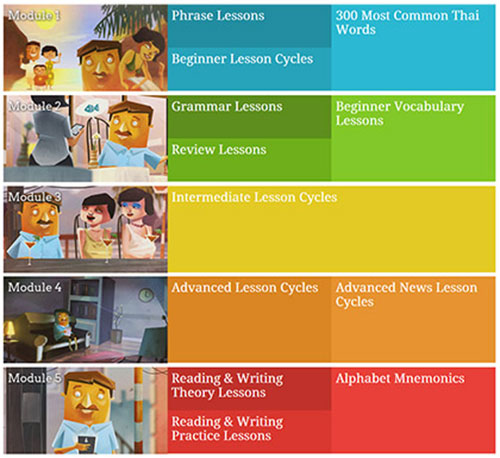
Getting Started with the Beginner Tools
Firstly, I should say don’t be put off by the name; it’s not a podcast that you have to tune into or download each week.
The name is derived from the original format, which is a spoken video lesson style. The course has been reorganized and repackaged in recent times, with more appealing artwork and better organization, but the Video-PDF-Audio format remains.
If you're a beginner to learning Thai, there's 4 core elements to start with:
- Start with 150 useful Thai phrases you'll use in everyday situations
- Learn the 300 most common Thai words that will get you creating sentences fast
- Use the 60 Thai sentence templates to help you start piecing sentences together
- Run trough the beginner lesson cycles to help you familiarize with question and answer scenarios
This beginner structure has been designed to get you talking Thai immediately, which helps prevent that disappointing “I’ll never be able to speak Thai” feeling that usually leads people to quit at the first hurdle.
Once you get comfortable with some basic phrases, the course takes you a little deeper into grammar.
There’s 42 grammar and word usage lessons, and each grammar lesson comes with a dedicated review lesson.
In addition, there’s special pronunciation lessons. I thought this was a good addition – because everyone struggles with this aspect of learning Thai due to the non-native nature of the alphabet.
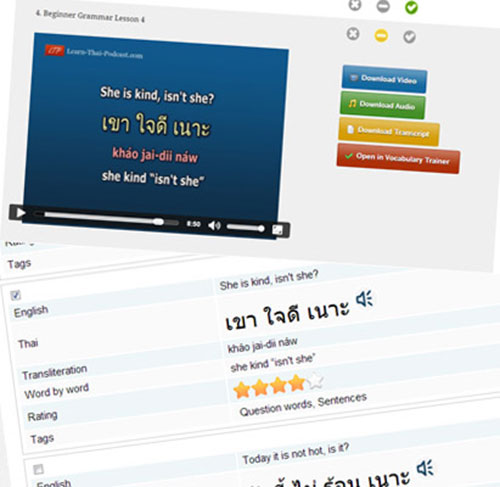
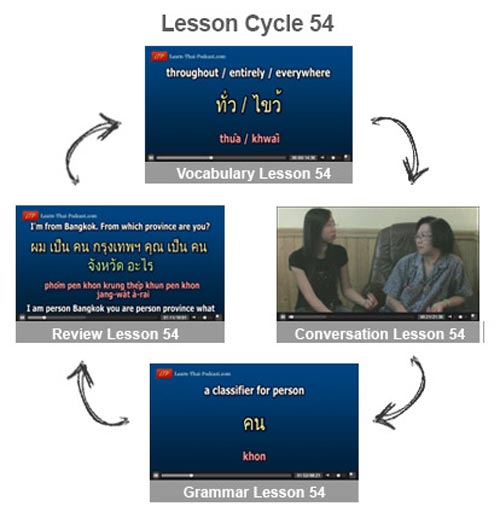
Learning to Read & Write Thai
Anyone who can speak Thai will tell you that you can rapidly advance your speaking proficiency by learning the alphabet.
My advice would be to jump straight into the alphabet section as soon as you can, if possible in tandem with learning your beginner phrases.
Trust me, you’ll be streets ahead of other learners if you learn the alphabet early on. The thing about Thai is that it's easy to learn lots of words without learning the alphabet. Indeed, I have met almost fluent speakers of Thai who can't read and write, at least not to a decent standard.
Sure, learning the alphabet isn't as easy as learning basic phrases with the phonetic text, but it's essential for laying down the foundation for intermediate and advanced speaking.
The course comes with a solid number of alphabet resources to take advantage, including Thai alphabet memory aids, theory lessons, practice lessons and writing exercises.

Moving Forward: Learning Intermediate Thai
Each of the 73 intermediate lesson cycles consists of four lessons that relate to each other, which keeps a nice context to the learning cycle.
The format remains the same: a vocabulary lesson, a conversation lesson, a grammar lesson and then a review lesson to test and reinforce what you've covered.
But where the intermediate level really steps up from ‘beginner' is that in addition to Central Thai (the Thai you'll hear spoken in Bangkok), there are specific lessons on different Thai dialects; for example, Northern, Southern and Northeastern.
This will be particularly helpful for those with a partner from a province outside of Bangkok, because as you'll know, when traveling to these places, the Thai is completely different, particularly in the deep South, and Northeast (where they speak Isaan, a unique blend of Thai and Laos).
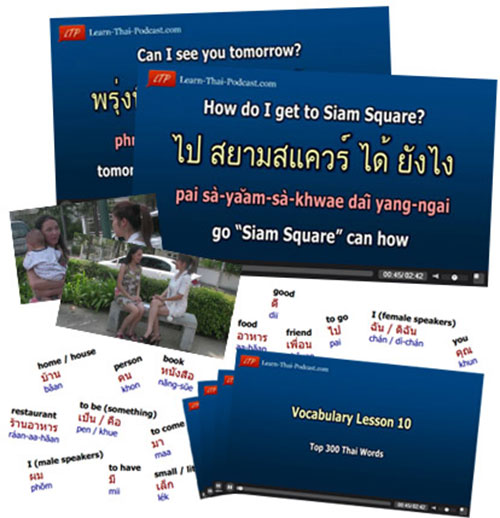
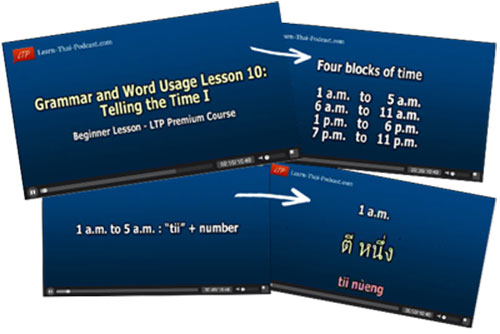
Advanced Level Learning
Advanced lessons follow a different format and are delivered in 16 lesson cycles.
However, like the beginner and intermediate lesson cycles, each consists of four lessons.
You’ll learn stuff like the following:
- How to follow along telephone conversations and other longer conversations between native Thai speakers.
- How to read, understand and listen to the much more formal Thai that is spoken in the news and TV shows.
- Besides the regular lessons, all advanced (and intermediate) lessons are also available in Thai only. This offers a real test to prove whether you can understand Thai without the aid of an English translation.
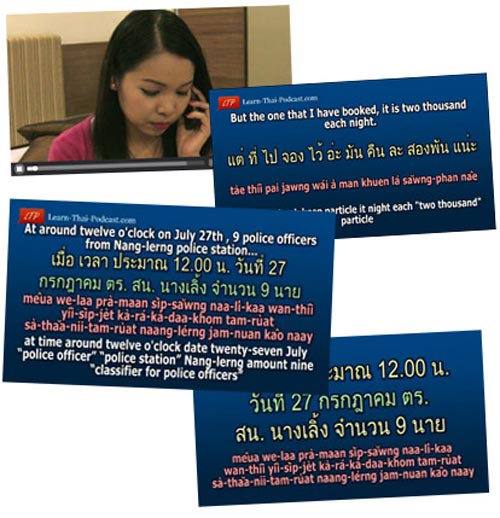
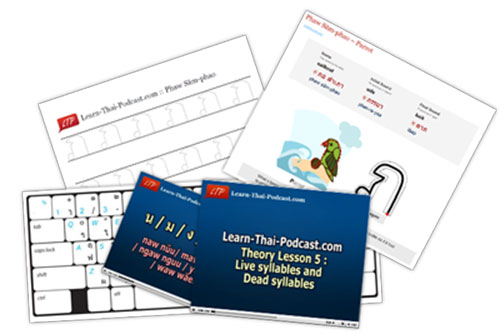
Multimedia: Downloading – Listening – Watching
As you'd expect with any online/digital course these days, you can study the Learn Thai Podcast course on your computer, tablet and smartphone. Each lesson is provided as an audio file to listen to, a pdf file to print, and a video file to watch.
That said, I find watching the expectation to download everything a bit amateur. I feel like a better portal could be created so that everything can be easily accessed and learned on the website. I know it's tricky on smaller screens, but the program needs some development in this area.
In this respect, I find Thaipod101 to be far superior.
=> Read about TP101 (my favorite program) here
Thai Podcast Course Pricing
The cost for the complete course is $197.
It's not bad value, but when you consider that there's no lesson feedback option (from a teacher), that the content remains fairly static (nothing new has been added for ages), and that the dashboard isn't interactive (you really need to download everything), it's fair but could be better value.
One positive on the price is that if you can’t afford to pay the total amount upfront, they offer a payment plan of 3 consecutive monthly payments of $49.95.
You will pay the first installment at the time you subscribe, then you will automatically be debited at the same time each month until the remaining 3 payments have been made.

My Thoughts, In Conclusion
I like The Learn Thai Podcast course.
It's got everything you need to jump in and start learning basic Thai very quickly. I dig the video lessons and the emphasis on learning the Thai alphabet. It also caters for intermediate learners, and has advanced lessons, too.
So it is comprehensive; I'll give it that.
However, I personally think the course needs updating a bit.
First and foremost: I think the portal needs an upgrade, so that it's truly mobile and users don't have to download material for an immersive learning experience.
I mean, I still like to learn from my computer, but if I swap to my tablet, or even my mobile, I don't want a fiddly experience where I am forced to download material that I'd rather view on screen.
I also think new content should be added more regularly. A diverse set of learning tools is essential to maintain interest and consistency, and to break up the learning process to avoid monotony.
Tests, quizzes, flashcards, ‘word of the day', lesson recaps, new words and even reward-based learning is part and parcel of the majority of modern language learning platforms these days.
The price is pretty reasonable though. It's a lifetime fee, which means no additional costs or upgrades.
Personally though, for a little extra money, I'd check out the Premium option on Thaipod101. It has so much more to offer.
Part of me is pained to say that; because Thaipod is run by a language learning company with a bigger budget than the independent Thai Podcast outfit.
But that's the way it goes, man. When you're laying out this much money, you have to go for not just best value but what's most likely to produce results.
Some Motivational Learning Advice
Remember, whatever course you choose, give yourself a fair chance to get to grips with the learning curve.
Consistency and persistence is everything. Set aside time every day to do some practice. Find a way to motivate yourself each day. Some days you won't feel like learning Thai, but do it anyway, even if it's just 20 minutes.
Every day you'll learn something new, and slowly a molehill turns into a mountain.
Everyone picks up things at a different pace, so don't get down on yourself.
For example, a guy in my condo block has been learning Thai for about a year. I remember that after a month of learning he was almost ready to give up because he felt he just wasn't making enough progress.
Fast forward to today and he now texts his girlfriend in Thai, all the time!
Me? I am terrible at remembering names let alone learning a language.
But it takes time…
Just yesterday, at my friend's office, a woman started talking to me about the rain we've been having and how it has made her journey to work very difficult. I was confused because where I live it has been raining at night and not in the morning. So I answered and explained this to her in Thai.
She was really impressed because she didn't know I could speak Thai (I usually speak English with the people at this office).
She complimented me on how native-sounding my accent was. Of course, she was being overly nice (most likely), but the point is she understood me. I'm no expert, but I can hold a decent conversation, and that's really rewarding.
Learning Thai gives life in Thailand a whole new perspective. It opens doors. It helps you integrate and enjoy the experience that much more.
You might well find your progress is very slow to start with but gathers pace around month 2 or 3.
Some people grasp simple conversational Thai very easily but never get to the advanced stages because they can’t get to grips with the tones and long sentences; others are better with the technical aspects.
Everyone’s learning experience is slightly different. Focus on your learning pathway, not the progress of others. If you really want to learn this language, you can. And you can be very good at it.
I've met guys here who didn't finish high school but can speak fluent Thai. Go figure!
If you have any questions or need advice, drop it in the comments section below.
Last Updated on
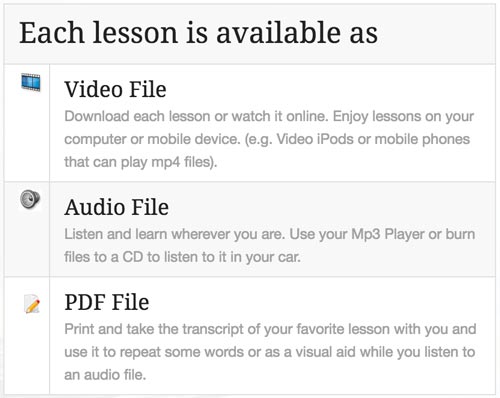



Manuel says
Manuel here from LTP. I’ve taken over LTP earlier this year and I’ve gone through the comments. Thank you for the valuable feedback of everyone. I can certainly confirm that we have not added any new content now for a while and there will be no new content added in the foreseeable future.
Having said that, the website was offline for a while and I completely re-did the User Experience in the backend. We are not going anywhere and we still respond to emails (learnthaipodcast at gmail.com).
Rhonda is not Sunisa, Sunisa is Jo - the Thai voice in the course. But Rhonda - a former part time staff from the US took over Sunisa’s email account and replied queries. Either way, I m currently monitoring the email and we are online and in normal operations. From what I can hear from our past and new customers even though our content is dated - it is still relevant and one of the best out there. So if you have questions simply email me and I’ll try to respond asap.
Thank you!
Manuel
Nov 21, 2023 at 12:29 pm
Rolf Dörflinger says
I read your dialogue with interest.
I started the course at the beginning of February 2020 assuming that the course would not be expanded, but that support would still be provided.
I am a beginner and would like to work through the lessons. Starting with Lesson 3, all dialogues are missing. Ronda no longer replied to my email. Before I made the payment, she wrote me the following.
-------------------------------------------------- ---------------
Hi Rolf,
Thank you for your interest. Our course is complete, so no new material is being added. However, it is all online and available for you to study online for the next 5 years or to download and study offline for as long as you like. Please let me know if you have any other questions about our course or need assistance with anything.
Best regards,
Rhonda
-------------------------------------------------- ----------------
Since support is no longer provided, I feel ripped off.
Best regards
Rolf
Jun 08, 2020 at 9:03 pm
jack says
LTP is the only sensible online package out there. IMO.
Any idea how I could contact them directly?
Apr 07, 2020 at 4:26 pm
TheThailandLife says
Apr 07, 2020 at 5:10 pm
Terry says
I think Paypal is always on our side (+our credit card details are protected), in the event there is any issue, just lodge a report to Paypal. But so far so good for me, i really enjoyed their course!
Apr 16, 2020 at 2:15 pm
jack says
Apr 18, 2020 at 4:49 pm
Matt Owens Rees says
I found I had to email Rhonda several times
I no longer recommend them and neither does Peter if you read this entire thread
But, if they've already taken your money, persevere with the emails. Don't let up
Again, I hope your lucky
Apr 18, 2020 at 9:15 pm
Matt Owens Rees says
I think we've both been caught by LearnThaiPodcast and the way it is now operating. We both recommended it as the best, admittedly with some flaws, available online course.
They are still touting for new business even though they are not updating it and no longer offering ant support. Despite making a claim that they do.
They won't give refunds once you've paid in spite of heir promise to do so.
I feel saddened that I've recommended this rogue outfit. Do you feel the same and what can be done about it.
Matt Owens Rees
Jan 19, 2020 at 7:43 am
TheThailandLife says
Jan 20, 2020 at 4:27 am
Matt Owens Rees says
Rhonda is the name she uses in LTP. It is not even her Thai nickname. Her name is Sunisa Lertwatanakul.
Quite properly, no one is recommending them now, it seems. They appear to have gained customers in the past by engineering reviews - most of which have been very positive. I've only seen one that comment on the grammatical and pronunciation errors of the German speaker (Jay) which makes understanding the Thai translation difficult. In one lesson, Jo takes the English role and it's faultless.
The poor video quality of some podcasts and the inappropriate topics, interviewing a girl about her pregnancy is the best example of that. They seem to have got bored in the later lessons, They could have persevered in giving people a Thai learning experience that was relevant and helpful. There would have been no need for lots of bells and whistles. It needed an understanding of how to teach (Jo should have taken the lead and been stricter on the way the business was being run in my view) The lack of investment was not the problem.
Jan 20, 2020 at 7:24 am
TheThailandLife says
Jan 20, 2020 at 6:32 pm
Matt Owens Rees says
As you said earlier, she even ignored your repeated emails for a time making you ask what was going on. She then gave you a "holding " response of saying there would be continued support. Her response to me was very different.
Thais know that farangs tend to believe what they're told and her responses, on behalf of Jay and Jo of course, were to be expected.
The bottom line is that they are are still taking money from new customers (I've had 2 friends test that) but as we both now know there is no support. It's not the lack of new content that is the issue, it's the fact they are not correcting the errors and problems in the podcasts that they have been made aware of.
I don't think it's a problem of lack of finance. It's a bare bone venture anyway, cutting costs wherever they could. I think you're right when you speculate that it could be a rift that the business has "come to and end" as you put it. I think Jo has told Jay there must be changes and he has refused. Jo is Thai (with a sense of doing one's best for others - it's a Thai trait). Jay is German and does things his way even when problems are pointed out.
As I said earlier. on one of the podcasts Jo spoke both the English and Thai parts. That worked and it did not cost them any more money. But they never repeated that experiment.
My frustration , and I hope yours too, is that we have both recommended this course, not aware at the time what was going to happen. I'm sorry for people who have spent money for a course which, as you say, is from a business that is "coming to and end" and saddened that they have gained from glowing reviews, from a number of sources, of their course in the past, many of which Jay engineered himself by portraying himself as being ultra helpful and supportive.
Jan 21, 2020 at 7:32 am
TheThailandLife says
Jan 21, 2020 at 5:07 pm
Matt Owens Rees says
The last comment you refer to was a generalisation. Thais do think like that. No reference to you at all
Jan 21, 2020 at 5:18 pm
TheThailandLife says
Jan 22, 2020 at 5:00 pm
Matt Owens Rees says
Others have, I assure you, not had that courtesy. But there's nothing either of us can do about that.
I'm putting out a comment on my website and on Facebook.
Jan 22, 2020 at 6:44 pm
TheThailandLife says
Jan 22, 2020 at 9:04 pm
Matt Owens Rees says
Jan 13, 2020 at 11:59 am
TheThailandLife says
Jan 13, 2020 at 4:32 pm
Matt Owens Rees says
"Unfortunately, the course is complete and Jay and Jo are no longer actively involved. I can send your questions to Jo and let you know her reply."
No reviewer now seems to be recommending this course.
The danger is that it seems that there is no further support and, in the absence of any transparent comment from LearnThaiPodcast, it appears that subscribers, who have already paid for the course, will be left high and try if the course is taken down.
Under Thai law, there is no effective redress for customers
What nationality is Jay?
Dec 12, 2019 at 8:00 am
TheThailandLife says
Dec 12, 2019 at 7:12 pm
Matt Owens Rees says
My internet connection here is very poor and Rhonda agreed to send me a flashdrive of the course. However, what I received was an old and partial version of the course. It seems Rhonda accepts that that was the case. I gather she is being used by Jay to field off questions, criticisms, and worries that are now hitting LTP on a daily basis.
I feel for Rhonda as she seems an honest and helpful person and Jay, as owner of LTP, should not be putting her in this position.
Maybe there is something more in Rhonda's comment that, "Jay and Jo are no longer actively involved"
LTP does indeed have value but letting it drift like this will decrease its value to a potential purchaser. I think no-one will want to buy it: it's technically not good and Jay's pronunciation and grammar mistakes are too numerous. In my view, it's the best of a poor choice of Thai courses but is now not being well received by reviewers. Jay does not seem to be bothered with the direction LTP has taken.
It may be that he has decided not to continue to pay the website fees. He has already received all course fees up front from existing customers
Dec 13, 2019 at 9:52 am
TheThailandLife says
Dec 15, 2019 at 3:48 am
Matt Owens Rees says
Thanks for keeping me in the loop on what's going on at LTP. I had a very different response from Rhonda, NOT confirming (or denying) that the course is being discontinued. I think she is not in a position to tell anyone what is actually going on. That explains why there was an initial reluctance to answer customers' emails (as we both experienced) and why now she is having to go into damage limitation mode.
Reviewers no longer seem to be recommending the course which, as you have said, is a pity because it's probably the best course on the market even with its many faults.
Without reviewer recommendation and without active participation by Jay and Jo, (no longer actively involved as Rhonda puts it) it's difficult to see how the course can continue and stay online.
Why would Jay want to continue paying web address fees when he has already received up-front payments for a course he confirms is not now going to be kept up to date? Rhonda says, of course, that she will continue to give support but she is not the site owner.
I think Jay is probably Hungarian (certainly not French, given his pronunciation and grammar) and they have a very aggressive way of running and discontinuing businesses inconsistent with customer needs. And Thais, of course, do not have the western concept of guarantees. Once you've paid for a product or service in Thailand, you're very much on your own.
Incidentally, I've subscribed to your webpage. You seem to be on my wavelength in stressing the importance of integrating into Thai society and doing all you can to achieve an understanding of Thai culture and lifestyle.
Dec 16, 2019 at 8:16 am
TheThailandLife says
Dec 17, 2019 at 6:01 pm
Matt Owens Rees says
Anyone have better information.
Dec 11, 2019 at 12:43 pm
TheThailandLife says
Dec 11, 2019 at 9:27 pm
Eric says
Many life changes later and Now i find myself much more motivated. I restarted LTP and have manged to figure out ways to use it while commuting to work and back here in the USA. It's been not too easy to access, download and play in the car on my iPhone but I've mostly managed it.
However, now my "subscription" has ended apparently and I cannot access the materials i was. Apparently your $200 or so gets you 5 years access and then it is removed. I can attest that you will still get removed. I'm annoyed and don't think I should have to pay another $200 to regain access.
I'll look into ThaiPod101 and see what i can do with it if reasonably priced.
Oct 31, 2018 at 12:49 am
TheThailandLife says
Oct 31, 2018 at 1:39 am
James says
I just signed up for Learn-Thai-Podcast.com (LTP) and wanted to put a couple of things out there that might help some others looking at Thai language lessons. First I have tried a number of ways to work on my Thai over the past 5 years: books, Skype lessons, in-person lessons, a variety of websites. Even down to asking my Thai friends how to say a specific thing and then getting the eye roll when I totally fail. I also need to say I'm a cheapskate so the cost was important.
When I was evaluating courses I was looking for something where the lessons were focused and concise and didn't wander all over the place. I wanted something that was in manageable chunks and didn't scare the bejeezes out of me with the massive scale of what they expected me to learn (read ThaiPod 101 there (which, I think could be an awesome resource if I had the money and time)). I ended up going with LTP because of these elements.
The lessons are a blast. You're presented with about a 10 second conversation that is completely deconstructed so you understand exactly what's being said and why. There are vocabulary resources and various forms (video, audio and PDF) depending on what you want to do. Plus, the conversations in the lessons are not presented by the same people so you get some practice listening to different voices. So, yeah, all of what you said in your review was spot-on.
But there are a few things that a prospective student should be aware of.
First, their transliteration scheme is different than most I've come across. ("awy" instead of "oi", "p" instead of "bp", things like that) It takes some getting used to. Some - but only some - of the dipthong consonants (like dtaw dtao) are transliterated as the single sound ("d" in this case) but spoken correctly in the lessons. I think this is a disservice to the incompetent (me) learner as I tend to read the transliteration and get confused when what's written doesn't look like what he or she is saying in the audio.
Second - They don't get the alphabet right in the vocabulary lessons. For example ก (gaw gai, or gor gai depending on what you started with...) is said to mean "chicken" in the vocabulary lesson instead of "the "g" sound in the word for chicken" which is what the letter name basically means. Since I've spent a bit of time learning already this is mostly just annoying but for a real beginner this could be a problem.
Third - There is no way to test yourself in the system. (This is the biggest downside compared to ThaiPod 101 IMO.)
They have review lessons but there's no way to be 100% sure you're getting it right. Enter two other resources: Memrise and Google Translate (running on Chrome). Memrise has extensive lessons that feature the ability to endlessly review in a testing format. I'm using this as support for LTP's reading/writing lessons and I'm sure it would work for others as well. The thing with Google Translate on Chrome is that you can talk to it, and, since LTP audio can come out of your PC's speakers, LTP can talk to it too.
Basically, I just practice the lesson segment, speak it to Google Translate, and see what it thinks I've said. If it comes back correct, great. If not I can let LTP say the sentence and see what Google thinks it is. If LTP gets it right then the fault is mine and I can keep practicing. If not (especially if LTP and I get the same wrong result) I get instant positive feedback. Which is a great confidence builder.
So I went with LTP. The cost was right. The lesson plan and format excellent and the program's shortcomings are easily worked around.
I hope this is helpful.
Jun 13, 2017 at 5:55 am
TheThailandLife says
I think you've nailed the fundamental difference between LTP and Thaipod. As a company I think TP has a bigger budget to allocate to development and therefore has a wider range of resources such as the testing.
But the LTP deconstruction is very good. I have used both and think they are both beneficial. I personally find it is good to have a few resources available as learning should be a cross-channel experience, so to speak.
Your comment regarding ก and the alphabet on LTP confused me a little. I kind of get what you mean, but Thais would refer to that as Gor Gai (Chicken), rather than simply Gh (ger, or whatever). So I think they have probably chosen to use this system to maintain consistency with how Thai is taught. Or am I misunderstanding you here?
In terms of transliteration: this is always an issue that comes up because there are variations of the standards -- i have seen many. This can be problematic for those who want to jump straight in and learn to speakThai without learning the alphabet (and many do successfully) because they see variations.
However, once you are passed the beginner stage I think slight variations become quite obvious, and as long as the transliteration isn't way off then you work it out quickly.
Jun 14, 2017 at 5:33 pm
James says
Right! In LTP the equivalence is chicken = gaw gài (กอ ไก่) not ก = gaw gài (กอ ไก่) or chicken = gài (ไก่). They do the same with the other letters. Look in their Reading/Writing Practice Lesson 1. As with the transliteration it's something to be aware of but not a show stopper.
Jun 14, 2017 at 11:47 pm